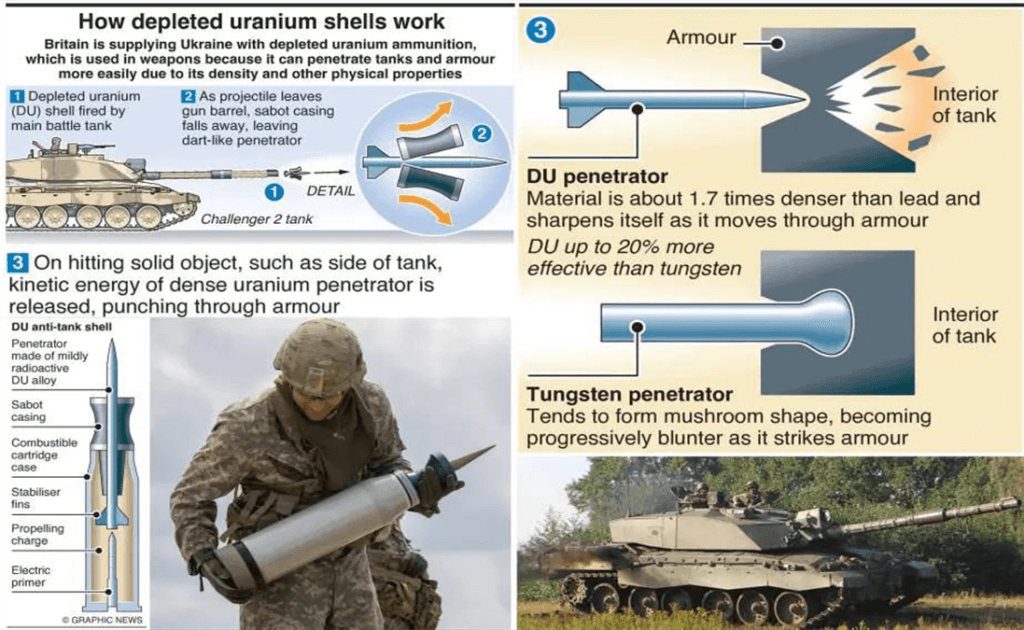Depleted uranium munitions, which were recently announced to be provided by the British government to Ukraine, are a type of weapon that contains depleted uranium. Depleted uranium is a byproduct of creating enriched uranium, which is used in nuclear reactors and nuclear weapons. Depleted uranium is much less radioactive than enriched uranium, but due to its high density, it is used in weapons as it can easily penetrate armor plating.
Countries producing depleted uranium munitions
Apart from the US and Britain, other countries that produce uranium weapons include Russia, China, France, and Pakistan. These weapons are not classified as nuclear weapons, as per the International Coalition to Ban Uranium Weapons. Another 14 states are known to store them.
Risks associated with depleted uranium munitions
Although depleted uranium munitions are not classified as nuclear weapons, they emit low levels of radiation and can cause severe health problems. Ingesting or inhaling depleted uranium is dangerous, as it depresses renal function and raises the risk of developing a range of cancers. Depleted uranium munitions that miss their target can also poison groundwater and soil.
Use of depleted uranium munitions
Depleted uranium munitions were used in the 1991 Gulf War to destroy T-72 tanks in Iraq. These weapons were also used in the 1999 NATO bombing of Yugoslavia and the 2003 invasion of Iraq.
International Coalition to Ban Uranium Weapons (ICBUW)
The International Coalition to Ban Uranium Weapons (ICBUW) is a global coalition of 160 groups in 33 countries. ICBUW aims to promote a campaign based on reliable information on depleted uranium weapons. It campaigns for a ban on the use, transport, manufacture, sale, and export of all conventional weapon systems containing uranium. It also seeks health monitoring and compensation for communities affected by the use of uranium weapons and the environmental remediation of such sites.
Draft Convention for a ban on depleted uranium weapons
ICBUW has prepared a draft Convention for a ban on depleted uranium weapons. The draft Convention contains a general and comprehensive prohibition of the development, production, transport, storage, possession, transfer, and use of uranium ammunition, uranium armor-plate, and of any other military use of uranium.
The Convention also outlines obligations concerning the abolition of uranium weapons and the destruction of uranium weapons construction facilities. It obliges states to ensure a rapid decontamination of radioactive battlefields and test ranges, emphasising the protection of civilians living in these areas, and obliges states to compensate the victims.

Why In News
The decision by the British government to provide Ukraine with depleted uranium armour-piercing rounds has raised concerns about the risks of using such weapons and the potential for long-term harm to human health and the environment. The move also highlights the ongoing controversy and international efforts to ban the use of depleted uranium munitions.
MCQs on Depleted Uranium Munitions
-
What is depleted uranium?
A. A type of nuclear weapon
B. A byproduct of the process of creating enriched uranium
C. A highly radioactive metal
D. A type of chemical weapon
-
Which countries apart from the US and Britain produce uranium weapons?
A. Russia, China, and France
B. Pakistan and Afghanistan
C. India and North Korea
D. Canada and Mexico
-
What are the risks of using depleted uranium munitions?
A. High levels of radiation and risk of developing a range of cancers
B. No risks as depleted uranium is not radioactive
C. Risk of explosions and collateral damage
D. Risk of causing earthquakes and tsunamis
-
What is the aim of the International Coalition to Ban Uranium Weapons (ICBUW)?
A. To promote the use of uranium weapons in war
B. To encourage countries to increase their stockpile of uranium weapons
C. To campaign for a ban on the use, transport, manufacture, sale, and export of all conventional weapon systems containing uranium
D. To promote the use of nuclear weapons in war
Boost up your confidence by appearing our Weekly Current Affairs Multiple Choice Questions
![]()


